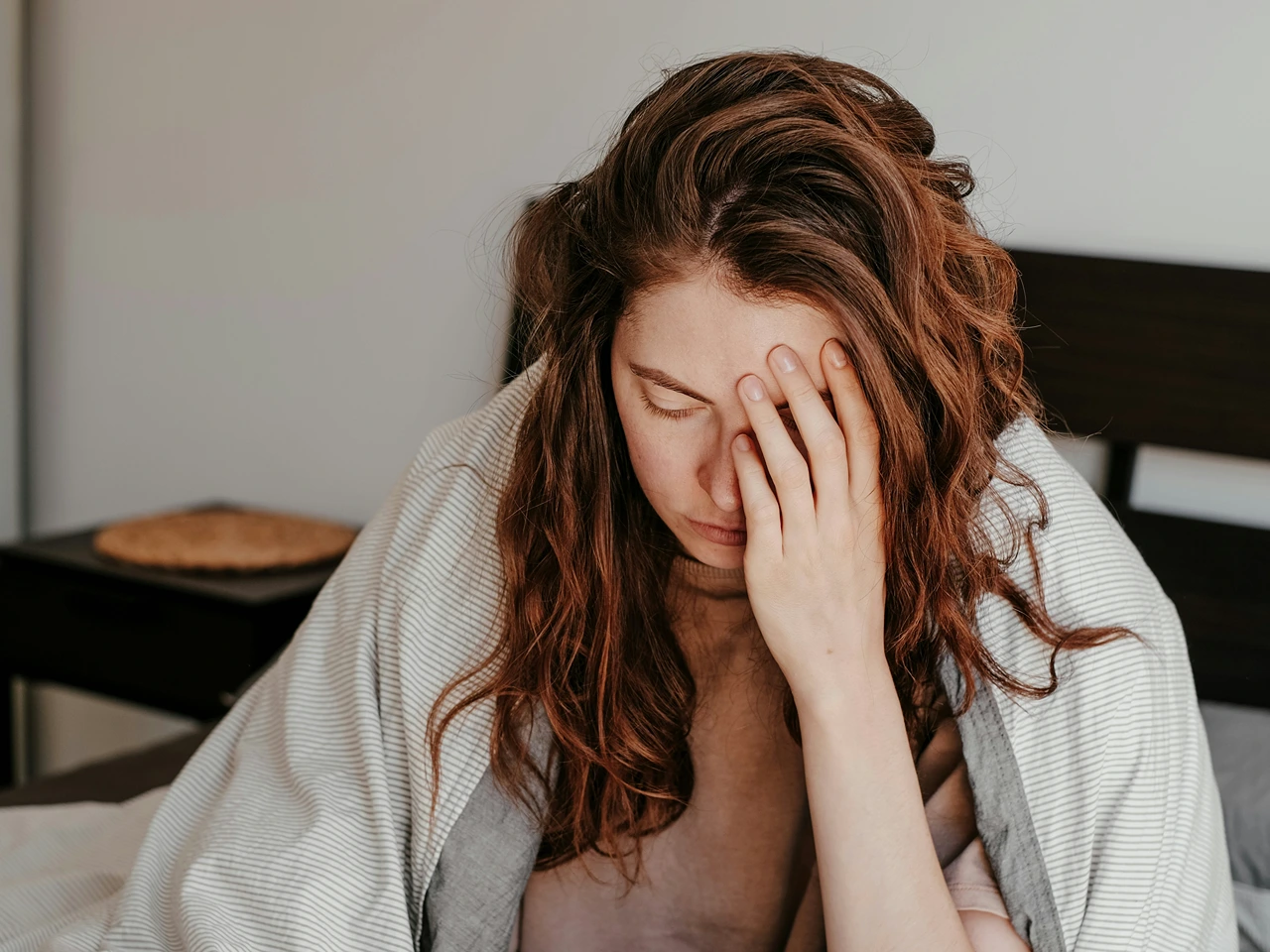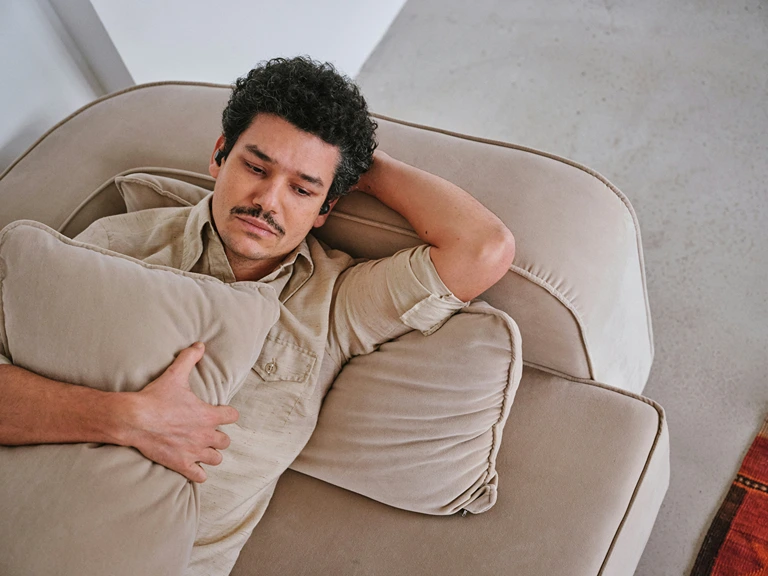
Hungry But Don't Want to Eat? How Loss of Appetite Relates to Eating Disorders
Feeling hungry but have no desire to eat? Learn what causes this disconnect between hunger and appetite, and how it can signal deeper issues like stress, anxiety, or eating disorders.

Feeling hungry but not wanting to eat can be confusing and pretty frustrating. You might feel hungry, but nothing sounds good, or notice that you lack an appetite even when your body clearly needs nourishment. While occasional changes in appetite are normal, a persistent loss of appetite can point to something deeper—whether it’s emotional stress, physical imbalance, or an early sign of disordered eating.
This disconnect between hunger and desire can leave you unsure of how to respond to your body’s needs. Read on as we explore what it means when you feel hungry but have no appetite, the possible causes behind it, and how to gently restore your relationship with food in a healthy way.
Why am I Hungry But Don’t Want to Eat Food?

Sometimes, your physical hunger signals and psychological resistance don’t align. You may feel hungry, but your mind rejects the idea of eating. This disconnection between body and mind can happen for several reasons.
Stress and anxiety often interfere with how your body interprets hunger and appetite. When you’re anxious, the body releases stress hormones that suppress your desire to eat food. This makes it harder to recognize true physical hunger, even though your body needs nourishment.
Additionally, hormonal changes can greatly affect your appetite. For example, fluctuations in ghrelin and leptin—the hormones that regulate hunger signals—can make you feel physically hungry one moment and completely without an appetite the next.
Sometimes, feeling hungry but lacking the desire to eat is your body’s way of signalling emotional fatigue or mental exhaustion rather than actual hunger for food.
Common Causes of Appetite Loss

There are many possible causes behind a low appetite or a decrease in food interest, ranging from physical to emotional factors. Understanding these potential causes can help you identify what might be affecting your desire to eat and guide you toward healthier eating habits.
Depression and Anxiety
A mental health issue like depression can make you not want to eat or even cause you to lose interest in certain foods you once enjoyed. Anxiety can have a similar effect, as constant worry or tension may make it difficult to focus on eating a meal.
Chronic Stress
Prolonged periods of chronic stress can result in a poor appetite, as the body stays in a “fight or flight” state that suppresses hunger hormones and disrupts normal eating patterns.
Medical Conditions
Some illnesses or underlying health problems—such as infections, thyroid imbalances, or digestive disorders—can change your appetite significantly. These conditions often interfere with how your body processes hunger signals.
Digestive Issues
Nausea, bloating, or stomach discomfort can make eating a meal feel unpleasant, even when you know your body needs nourishment. Over time, these sensations can contribute to a low appetite or avoidance of certain foods.
Grief or Emotional Trauma
Going through loss or emotional pain can make it hard to feel hungry. When you’re grieving, it’s completely normal to lose your appetite or just not feel interested in eating.
Poor Sleep Patterns
Prolonged periods of inadequate or disrupted sleep can alter hormone levels responsible for hunger and fullness, leading to a change in your appetite and irregular eating habits.
Irregular Eating Schedule
Skipping meals or eating at random times can throw off your body’s natural rhythm, leaving you feeling hungry but not really in the mood to eat. Over time, this kind of pattern can make your appetite even weaker.
When a lack of appetite lasts longer than a few days or starts affecting your nutrition and energy levels, it’s important to pay attention—it may be more than just temporary stress and worth discussing with a healthcare professional.
When Loss of Appetite Signals an Eating Disorder

Sometimes, what feels like a simple loss of appetite can actually be a sign of a more serious eating disorder. If it doesn’t go away, it’s important to tell the difference between a normal change in hunger and a disordered pattern.
In an eating disorder like anorexia nervosa, individuals often don’t feel hungry or deliberately ignore hunger signals despite the body’s need for food. Others may struggle with avoidant/restrictive food intake disorder (ARFID), where they feel hungry but don’t want to eat because of food aversions, texture sensitivities, or fear of discomfort.
The main difference between regular appetite loss and disordered eating is in the way you think about food. If you find yourself overthinking meals, feeling guilty after eating, or constantly avoiding foods like whole milk, rice, or meat, this may point to disordered eating behaviours.
Left unaddressed, these habits can cause significant physical and mental health consequences, including fatigue, nutrient deficiencies, and emotional distress.
What You Can Do to Stimulate Your Appetite

When you don’t have an appetite, eating can feel like a chore—but there are gentle, effective ways to help stimulate your appetite and make food feel inviting again.
- Establish regular meal times: Even when you’re not hungry, try to eat every few hours. This helps reset your body’s internal rhythm and gradually restores normal appetite or hunger cues over time.
- Start with small, frequent meals: If big portions feel overwhelming, eat small meals throughout the day instead. Smaller servings are easier to eat and help keep your energy and nutrient levels steady.
- Choose nutrient-dense foods: Opt for foods like avocados, eggs, nut butters, or smoothies made with whole milk. They’re packed with nutrients and calories without adding too much volume, making them more manageable when you don’t have an appetite.
- Incorporate gentle exercise: Doing light physical activity—like a short walk, breathing exercises, stretching, or yoga—can have a positive effect of exercise on appetite. It boosts circulation, improves digestion, and can naturally help stimulate your appetite.
- Manage stress levels: Stress and anxiety can suppress appetite or hunger, so find calming routines that work for you—deep breathing, journaling, or quiet time can all help your body relax and regain its natural signals to eat.
- Practice mindful eating: Take your time when you eat—savour each bite and really enjoy the flavours. Creating a calm, pleasant atmosphere can help make mealtime feel more natural and enjoyable instead of something you have to force.
These small, consistent actions can make it easier to eat and bring back the satisfaction of nourishing your body, even when you don’t have an appetite.
When to Seek Professional Support

If your loss of appetite lasts more than a week, or you start noticing major weight loss, tiredness, or dizziness, it’s a good idea to reach out to a healthcare professional. A healthcare provider can help figure out whether your loss of appetite is linked to a medical condition, side effect from medication, or a mental health concern.
Red flag symptoms include:
- Rapid weight loss
- Feeling full after just a few bites
- Constant fatigue or weakness
- Loss of appetite persists even when you try to eat something
- Emotional distress around food
Depending on your situation, your healthcare provider may recommend seeing a nutrition counsellor, therapist, or medical doctor to address your specific needs. Treatments may include therapy for issues like depression or anxiety, dietary guidance, or medical evaluations.
Experiencing a loss of appetite doesn’t always mean something is seriously wrong, but when it begins to affect your daily functioning, seek medical attention early. With proper support, you can regain your appetite, reconnect with your body, and restore a healthy relationship with food.
Final Thoughts
Reconnecting with your appetite takes patience and compassion, not force. Try to nourish yourself in small, manageable ways, and don’t hesitate to seek professional guidance if your loss of appetite persists.
Sometimes, the issue is about healing your relationship with it. Eating is an act of self-care and balance. With the right support, you can slowly get your appetite back, feel more energized, and learn to trust your body’s natural hunger signals again.
Frequently Asked Questions
Why do I feel hungry but have no appetite?
Feeling hungry but not really wanting to eat can happen when your body and mind are sending mixed signals about food.
Mind-Body Disconnect: You might feel hungry physically, but your mind resists food due to stress or fatigue.
Temporary Change: Your appetite may fluctuate naturally because of hormones, mood, or lifestyle shifts.
Emotional Influence: Mental exhaustion or worry can suppress hunger, leaving you without an appetite even when your body needs nourishment.
Physical Interference: Digestive discomfort or mild illness can cause you to feel sick, reducing the desire to eat.
Regain Balance: Try gentle habits that restore normal hunger cues, like rest, hydration, and light movement.
What are the main reasons why you may lose your appetite?
There are several reasons why you may lose your desire to eat, ranging from emotional distress to physical changes.
Stress and Anxiety: Ongoing stress can decrease appetite, as your body stays in a high-alert state that dulls hunger.
Health Conditions: Hormonal shifts, infections, or other physical factors can disrupt your body’s natural hunger rhythms.
Emotional Strain: Grief or sadness often leads people to go without food for long periods.
Sleep and Routine: Poor rest and irregular eating times can confuse your hunger signals and reduce appetite.
Gentle Recovery: When possible, try eating light, nourishing meals until your appetite begins to return.
Can a lack of appetite be linked to an eating disorder?
Yes, sometimes loss of appetite goes beyond temporary changes and can point to an underlying eating disorder.
Serious Disorders: In cases like anorexia nervosa, a type of eating disorder, people may ignore hunger cues even when their bodies need food.
Emotional Connection: For some, controlling food becomes a way to cope when life feels chaotic or out of control.
Physical Signs: Skipping meals or eating too little for long periods can lead to weakness, dizziness, and low energy.
Other Patterns: Periods of restriction can alternate with binge eating, creating a damaging cycle for body and mind.
Seek Help: If loss of hunger persists, talk to a professional to uncover the causes of your symptoms and begin recovery safely.
What can I do to stimulate my appetite when I don’t feel like eating?
When eating feels like a chore, small, comforting changes can help you bring your appetite back gently.
Start Small: Choose foods that feel easy to eat, like soups, smoothies, or soft meals that don’t overwhelm your stomach.
Pleasure First: Eat your favourite foods to encourage positive associations and make meals enjoyable again.
Mindful Movement: Gentle exercise can boost hunger by eating afterward, helping the body crave nourishment naturally.
Comfort Choices: Begin with something satisfying to eat that feels familiar and soothing.
Routine Habits: Eat regularly, even when you don't feel hungry, to retrain your body’s eating rhythm.
When should I seek help for ongoing loss of appetite?
If you’re struggling with appetite loss for more than a few days or losing energy quickly, it’s important to consult a professional.
Duration Matters: Loss of appetite for a short time can be normal, but persistent issues need evaluation.
Nutrient Concerns: Not being able to eat enough over time can lead to fatigue, dizziness, or nutrient deficiency.
Comfortable Meals: Focus on foods that are familiar and favourite foods that bring comfort and satisfaction.
Underlying Issues: Doctors can help rule out medical, emotional, or psychological causes of your symptoms.
Recovery Path: Getting guidance can help restore balance, rebuild your desire to eat, and make nourishment feel natural, comforting, and truly enjoyable again.
Check out more helpful articles
Lorem ipsum dolor sit amet, consectetur adipiscing elit, sed do eiusmod tempor incididunt ut labore et dolore magna aliqua. Lorem ipsum dolor sit amet, consectetur adipiscing elit, sed do eiusmod tempor incididunt ut labore et dolore magna aliqua.
I Hate My Dad: Reasons Why You Feel This Way and How to Cope
Struggling with thoughts like “I hate my dad”? Learn the reasons behind these feelings and explore healthy ways to cope and heal your relationship.

I Hate My Mom: Why You Might Feel This Way and How to Heal Your Relationship with Your Mother
Struggling with “I hate my mom” feelings and family conflict? Learn how to cope with strong emotion, set boundaries, and heal your relationship with your mother.

I Don't Want to Do Anything: Why You Feel Mentally Exhausted and What You Can Do About It
Feeling like you don’t want to do anything? Find out why you feel unmotivated and learn practical ways to restore your motivation, balance, and mental well-being.

Contact US
Know who you want to book with?
Book Online HereHave questions about counselling or something else?
Call or email us.
Want help choosing the right therapist? Complete our connect form below.
We are ready and looking forward to meeting you. Get started today by clicking the link below and booking your free 15-minute discovery call. All our services are private and confidential.

Disclaimer: Content on this website is for informational purposes only. Visiting this website does not establish any type of therapist-client relationship with Upstream Counselling or its staff. Information obtained from this site does not substitute for a thorough medical and/or psychiatric evaluation by an appropriately credentialed and licensed professional.







